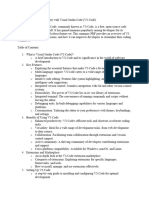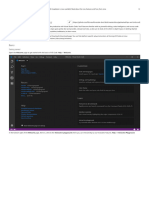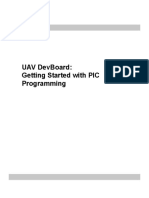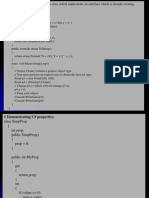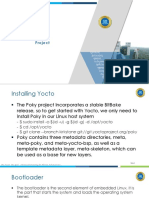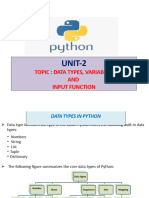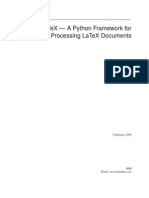VS Code, short for Visual Studio Code, is a free, open-source, and highly popular
source-code editor developed by Microsoft. It's renowned for its lightweight nature, powerful
features, and extensive ecosystem of extensions, making it a go-to tool for developers across
various programming languages and platforms.
Here's a breakdown of what makes VS Code so widely used:
Key Features:
● IntelliSense (Code Completion): Provides intelligent code completion, parameter info,
quick info, and member lists as you type, significantly boosting productivity. This works for
many languages out of the box and is enhanced by extensions.
● Debugging: Comes with a robust built-in debugger. You can set breakpoints, step
through code, inspect variables, and evaluate expressions, making it easier to find and fix
bugs. It supports debugging for JavaScript, TypeScript, Node.js natively, and for other
languages via extensions (e.g., Python, Java, C++).
● Integrated Terminal: A built-in terminal window allows you to run commands, scripts, and
build tasks without leaving the editor.
● Git Integration: Excellent built-in Git source control integration. You can easily stage,
commit, push, pull, and manage branches directly within VS Code.
● Extensions Marketplace: This is one of VS Code's biggest strengths. A vast
marketplace offers thousands of extensions that add new languages, debuggers, tools,
themes, and more. This allows you to customize VS Code to fit virtually any development
workflow.
● Syntax Highlighting and Code Folding: Provides clear syntax highlighting for a
multitude of languages and the ability to fold code blocks for better readability.
● Snippets: Built-in and custom code snippets allow you to quickly insert common code
structures.
● Multi-root Workspaces: Enables you to open and manage multiple project folders within
a single VS Code window, which is very useful for monorepos or projects with distinct
frontend and backend components.
● Customization: Highly customizable through settings, keybindings, themes, and
extensions, allowing developers to personalize their environment.
● Cross-Platform: Available on Windows, macOS, and Linux.
● VS Code for the Web (vscode.dev): A browser-based version of the editor that provides
a free, zero-install experience for quickly Browse source code repositories and making
lightweight code changes.
Popular Use Cases:
VS Code is highly versatile and used for:
● Web Development (Frontend & Backend): Excellent support for HTML, CSS,
JavaScript, TypeScript, React, Angular, Vue.js, Node.js, Python (Django, Flask), Ruby,
PHP, Go, and more. Extensions like Live Server, ESLint, Prettier, and various
framework-specific tools are widely used.
● Python Development: With the official Python extension, it offers features like
IntelliSense, debugging, linting, formatting, and Jupyter Notebook support.
● Java Development: The Extension Pack for Java provides a comprehensive set of
features including code completion, refactoring, debugging, and integration with
Maven/Gradle.
● C++ Development: While VS Code itself doesn't include a compiler or debugger, the
C/C++ extension provides rich language support (IntelliSense, debugging) and integrates
with command-line tools like GCC/Clang and GDB.
● Cloud Development: Strong integration with cloud platforms, particularly Azure, for
deploying and managing applications.
● Remote Development: Allows you to develop on a remote machine, inside a Docker
container, or in Windows Subsystem for Linux (WSL), providing a consistent development
environment regardless of your local setup.
In essence, VS Code is a powerful and flexible code editor that, through its extensive
extension ecosystem, can be transformed into a full-fledged IDE for almost any
programming language or development task. Its performance, feature set, and community
support have made it a dominant choice in the developer community.




